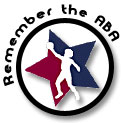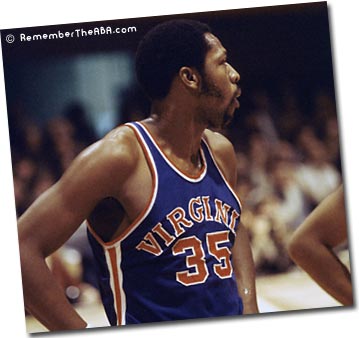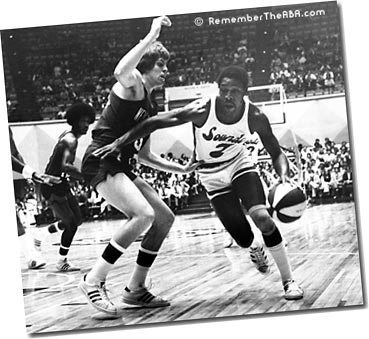Along with Stew Johnson, one of the more "well-traveled" All-Time ABA players - he spent time with
8 different ABA teams (and had two stints with
the Virginia Squires); Broke into pros with the NBA
Detroit Pistons, but his NBA chances were interrupted
by a military commitment; His true rookie season
was spent with the Washington Caps during the 1969-70
season; Lasted 7 seasons in the league; Hardworking
player who only made one ABA All-Star team (1971),
but most definitely made his mark on ABA; Known for
his short-range jumper and quick first step on the
baseline
From Jim
O'Brien's 1971-72 and 1972-73 Complete Handbook of Pro Basketball:
Led "Bonnies" for three years in scoring and
rebounding when they were a nationally ranked
college power . . . Made NBA Detroit Pistons
as a rookie for 1967-68 season, but was called into
two years of military service . . . Caught on
with 1969-70 Washington Caps, and made the trip
to Virginia when the franchise moved there .
. . Second to Charlie Scott in scoring for 1970-71
Squires, with 18.9 average, also grabbed eight rebounds
per game . . . Helped the Squires to the 1970-71
Eastern Division title and represented the Squires
(along with Charlie Scott) in the 1971 ABA All-Star
Game . . . May have been most improved Squire
during 1970-71 season, probably because opportunity
opened up when Rick Barry blasted the state of
Virginia, and forced trade to New York Nets .
. . Has little good to say about Barry, or Rick's
father-in-law, Bruce Hale, who wanted to cut
him when he was GM of the franchise . . . With
Barry on team, his main job was to get the ball
to Rick . . . but now he's come into his own,
and feels he'll continue to improve . . . "Wherever
I go," comments
Carter, "I want to do a job." . . . For
1971-72, split the season between the Pittsburgh
Condors and the Carolina Cougars . . . Averaged
19.5 points in 75 games during the 1971-72 season,
a figure that would have been higher had he played
more in his last 29 games with Carolina . . .
Grabbed almost 7
rebounds per game in 1971-72 season - "The smallest guy in the world
can get the ball," he says,
"if he boxes his man properly. If you're quick, you can juke
a guy into jumping on your back. There are ways." . . . For
1972-73, New York Nets dealt for Carter to get
offensive forward they needed to make up for
their own loss of Barry . . . He was born in
Buffalo and went to school there, so stint with
Nets is getting back to home state for George
. . . Sociology major, who still likes "to work
with kids" . . . Considered
an excellent driver with a good shot from corner
. . . Carter's game is speed and penetration. He drives the baseline
well, and gets that first good step on his man
. . . They call him "Dirty Dingus" but don't ask why







